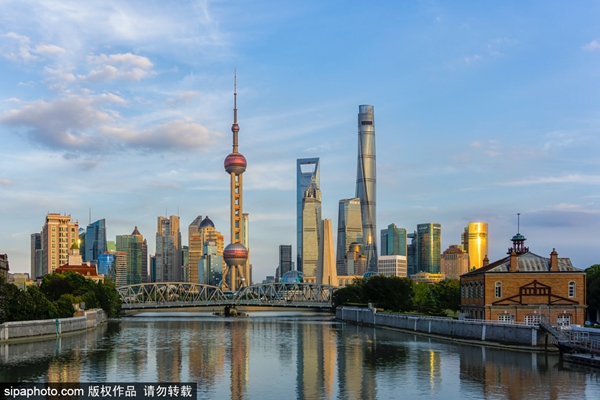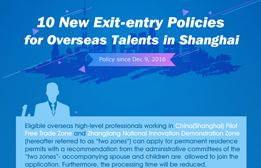Shanghai woos global talent

High-rise buildings are seen in Shanghai. [Photo/Sipa]
People with talent are a strategic resource for Shanghai and they are becoming an important manifestation of Shanghai's core competitiveness and soft power.
Since the 19th National Congress of the Communist Party of China (CPC), Shanghai has thoroughly implemented the strategy for developing a quality workforce in the new era, firmly established the strategic position of talent-led development, vigorously promoted the gathering of high-level talents at home and abroad, continuously deepened reform in talent development mechanisms and systems, and promoted the formation of a talent-related work system that can attract and retain talent, utilize them and ensure the social mobility of talent.
After continuous innovation and exploration, the total number of talents in Shanghai has continued to rise, reaching 6.75 million by the end of 2020, an increase of 12 percent from 6.03 million in 2016.
High-level talents continue to gather in the city. There are currently 184 academicians from the Chinese Academy of Sciences and the Chinese Academy of Engineering in Shanghai, an increase of 8 percent compared with 170 in 2016; 1,739 Shanghai's leading talents, an increase of 34.8 percent compared with 1,290 in 2016, and nearly 10,000 personnel receiving the State Council Special Allowance, an increase of about 11 percent compared with more than 9,000 in 2016.
Shanghai is also becoming an increasingly attractive destination for foreign talents. The city has issued 345,000 work permits to foreigners, and it has been selected as the most attractive Chinese city in the eyes of expats for 11 consecutive years.
Talent's innovation achievements continue to emerge in the city. The number of national science and technology awards given to Shanghai has accounted for more than 15 percent of the country's total for five consecutive years, and the number of the first prize winners from Shanghai has accounted for more than 20 percent of the country's total in the past three years. In recent years, Shanghai-based scientists have published a number of papers in the top three international academic journals - Nature, Science and Cell, accounting for more than 25 percent of the national total.
Since the 19th National Congress of the CPC in 2017, President Xi Jinping has inspected Shanghai for four consecutive years and made important instructions for Shanghai's talent-related work, requiring Shanghai to take advantage of its international environment to draw outstanding talents from various fields, and step up its efforts to become a hub for scientific and technological innovation with a global influence.
At the celebration of the 30th Anniversary of the Development and Opening-up of Pudong in 2020, Xi urged the area to adopt a more open and enabling talent policy to actively bring in high-caliber and top-notch talents, especially from the younger generation.
In September 2021, Xi established a goal at a central work conference on human resources to develop China into a global hub for talented people and innovation. The president also proposed building a leading area for high-caliber talent in Beijing, Shanghai and the Guangdong-Hong Kong-Macao Greater Bay Area.
In the past five years, Shanghai has been actively promoting talent-related work and has produced a number of innovative achievements created by talented people.
Upgrading incentive policies
Shanghai undertakes many of the country's important strategies, major projects, and key projects. These tasks require heavyweight talents to lead and make it necessary to speed up reform in the talent development mechanisms and systems, form a batch of replicable experiences and practices, and create a better environment for talents to innovate and start their own businesses.
In recent years, Shanghai has successively issued a series of important reform documents concerning talent policies including the 20 Provisions, the 30 Provisions, action plans for various talent projects, the plan for implementing the talent-led development strategy in the new era, the 14th Five-Year Plan (2021-25) for Talent Development to deepen reform in talent development mechanisms and systems, create a more effective talent policy system, and form a talent system with global competitiveness.
Shanghai's five "new cities" — Jiading, Qingpu, Songjiang, Fengxian and Nanhui, took the lead in building a regional talent gathering platform, formulating and implementing differentiated talent policies to support development, gathering overseas talents, young talents and urgently needed talents on a large scale to further promote the incentive and guiding role of talent policies.
In the Lin-gang Special Area, Shanghai implements an open system for talent management that gives full play to the area's unique advantages of independent development, independent reform, and independent innovation, creating a destination for overseas talents to gather and a habitat for comprehensive talent services, and a hub for talent resource allocation.
In terms of talent introduction, Shanghai has implemented a more open and more convenient talent introduction policy. It took the lead in the country to launch pilot policies such as lowering the entry threshold for foreign talents, simplifying entry and residence procedures, and relaxing the conditions for foreigners to apply for permanent residence permits. There are more than 11,000 foreign talents holding permanent residence permits in Shanghai, accounting for about one third of the national total.
In 2019, Pudong New Area made reforms to streamline procedures for attracting and retaining foreign professionals. Under the initiative, applications for work and residence permits can receive approval in five days. Ulrich Jablonka, a manager at the Shangri-La Group who obtained work and residence permits for foreigners on April 11, 2019, was among the first group of foreign professionals to benefit from the streamlined policies. A one-stop online service platform which allows more foreigners to enjoy such convenient services was also established.
Today, Shanghai's talent introduction strategies and policies have formed a complete system. The city's open environment and convenient services are particularly attractive to overseas talents. Shanghai is becoming a place frequently visited by high-level scientists and high-tech entrepreneurs. Coming to Shanghai to expand the "circle of friends" has become another reason why scientists like Shanghai.
Shanghai has held the World Laureates Forum for four consecutive years. Every year, hundreds of top scientists who have won Nobel Prizes and other world-class awards come to Shanghai to participate in the forum. The international scientific community for the world's top scientists has also been opened in the Lin-gang Special Area.
Openness, innovation and inclusiveness - the distinctive city characteristics, have been fully displayed in Shanghai's efforts to bolster talent development.
Deepening institutional reform
In terms of talent cultivation, Shanghai adheres to stressing both introduction and cultivation, optimizing and integrating the talent cultivation system, strengthening the cultivation of local talents, making bold use of young talents, focusing on the platforms' role, and continuing to promote the construction of the world-class large scientific facilities, major scientific and technological projects, and high-level innovation platforms.
In May 2020, Shanghai Qi Zhi Research Institute, a new type of research and development institution, was registered and established. Now it has gathered a number of academicians from the Chinese Academy of Sciences and the Chinese Academy of Engineering, as well as scientists and a group of young talents from universities to carry out research in frontier fields such as artificial intelligence, modern cryptography, and biological intelligence. Compared with traditional institutions, Shanghai Qi Zhi Research Institute has greater flexibility and autonomy in terms of fund usage. This autonomy gives scientists full trust and is also an exploration to support basic research outside of competitive projects.
Whether the vitality of talents can be fully released depends on the systems and mechanisms. In recent years, Shanghai has abolished a number of administrative approval and filing matters in the process of talent recruitment, professional title evaluations, and personnel flow, and has granted management powers such as employment, assessment and evaluation, and income distribution to employers, as well as allowed universities and research institutes to independently introduce talents and make overall arrangements within the quota.
In terms of talent utilization, Shanghai insists on "delegating powers" to employers by allowing research institutions and personnel to enjoy greater autonomy, which has helped attract and gather a group of top scientists and teams including Nobel Prize winners.
In terms of talent evaluation, Shanghai constantly improves the talent evaluation system oriented by talents' capabilities and contributions, and encourages leading companies to set up talent evaluation standards in the fields of integrated circuits, artificial intelligence and biomedicine.
For example, the Shanghai Institute of Materia Medica of the Chinese Academy of Sciences evaluates new drug researchers around the core goal of "publishing new drugs", linking clinical approval documents and new drug certificates with senior job appointments, so as to improve the enthusiasm of researchers to engage in new drug research and development, and to provide sustainable and transformable projects for the transformation of scientific and technological achievements.
Shanghai has also optimized the representative work mechanism and scientific research achievement evaluation model by using big data to carry out accurate evaluation of talents.
The city also granted autonomy to non-public enterprises in the field of artificial intelligence to introduce and evaluate talents. Since 2019, the senior professional title recognition of professional and technical talents in the field of artificial intelligence has been implemented, and enterprises can declare acceptance based on the market value and contribution of technical talents.
In addition, the Shanghai Light Industry Association and other industry organizations are allowed to undertake the evaluation of senior professional titles in related fields. Internationally-accepted evaluation elements and evaluation standards have also been adopted. For example, ShanghaiTech University is exploring to take the Tenure System as its core and draws on the international common evaluation methods to establish a new talent evaluation system that focuses on moral conduct, the ability to teach and educate people, academic levels, development potential, and international recognition.
In order to amplify and strengthen the incentive effect of market value, Shanghai has also given scientists greater power to choose technical routes, and have more control of funds and power to dispatch resources. In order to let talents obtain greater benefits from their innovation achievements, 70 percent of the net income from the transfer and transformation of scientific and technological achievements can be used to reward individuals and teams, and the policy of deferred payments of individual taxes for the transformation of achievements has also been implemented. In 2020, universities and scientific research institutes transformed achievements of 4.7 billion yuan ($701.67 million) through licensing, transfers, and valuation investments, and 234 million yuan in cash and equity was rewarded to individuals.
Stressing actual performance
Shanghai strives to become a city where everyone can fulfill their potential and come to the forefront in all sectors. It has always insisted that talent evaluation should be based on actual performance.
Focusing on the needs of key technologies in the bottleneck fields such as vaccine drug research and the development and integrated circuits, Shanghai set up a platform that gives full play to the role of leading technology companies to effectively solve the issues. In this way, the content of the project list is condensed, and the delivery and use of results is used as an assessment method, which has helped leverage various market forces across regions and industries.
Shanghai regards "attracting and retaining talents for the country" as its important responsibility. According to the strategic deployment of the Party and the country, the city provides strong talent guarantees and intellectual support for poverty alleviation, rural vitalization, epidemic prevention and control, and national strategies like the integrated development of the Yangtze River Delta.
Cadres from Shanghai have offered medical and educational aid to the Tibet and Xinjiang Uygur autonomous regions and Yunnan province, and made positive contributions to the decisive victory in poverty alleviation. In the fight against the COVID-19 epidemic in 2020, Shanghai took the lead in sending medical aid to Hubei province, dispatching nine batches of 1,649 medical personnel to Wuhan, the capital of Hubei, and carried out collaborative technical research with other provinces and cities to fight the epidemic.
Enhancing soft power
In recent years, Shanghai has insisted on improving talent services across the city and attached great importance to creating an ideal environment for talents from all over the world.
Located in the southwest region of Shanghai, a global innovation and entrepreneurship cluster sits near the Minhang campus of Shanghai Jiao Tong University. There are more than 10 entrepreneurship and innovation incubators, which have attracted many scientific and technological talents.
Talents who engage in innovation and entrepreneurship can easily find low-cost, convenient, and open makerspaces in Shanghai, because Shanghai took the lead to stimulate and gather market resources in the way of "no filing and no registration" to build the cradle for entrepreneurial talents, as well as in establishing the first domestic makerspace alliance to carry out industrial autonomy. A number of world-renowned incubators represented by WeWork, the founder of the global coworking startup, have settled in Shanghai.
In terms of optimizing the financing environment for talent innovation and entrepreneurship, Shanghai has set up venture capital guidance funds and angel investment guidance funds to provide funding sources for technological innovation enterprises. Policy-based guarantee funds have also been established to provide financing guarantee services for technology-based SMEs. The city has also set up China's first bank for technological innovation - SPD Silicon Valley Bank, and the Shanghai Intellectual Property Exchange Center. As part of efforts to improve the intellectual property protection environment, Shanghai established a mechanism integrating rapid response, rights protection assistance, and mediation for intellectual property infringement investigations and improved intellectual property financing services.
Shanghai also built a group of innovation and entrepreneurship demonstration bases which were selected from science and technology parks with concentrated innovation and entrepreneurship projects, high-level talents, standardized operations, and complete infrastructures to undertake high-level talent innovation and entrepreneurship projects.
The city held the Global Talent Innovation and Entrepreneurship Summit and published a catalogue containing Shanghai-based jobs for high-level talents, and a list of key and core technology research projects globally. It also held the "Stay in Shanghai" Career Meeting, and established the Venture Capital Fund Alliance. The Global Talent Entrepreneurship Competition is held in the city every year, and special support such as talent planning and financial investment is given to the winning projects.
As the external environment changes, Shanghai's talent-related work keeps pace with the times and responds to "changes" with "convenience".
Since March this year, Shanghai has actively responded to the sudden outbreak of the epidemic, carried out public services for talents during the epidemic in an orderly manner, and took the initiative to use innovative measures to resolve the uncertainty brought about by the epidemic.
During the period, many departments provided talents with visas, work permits, social security, medical insurance, taxation, customs clearance, medical treatment and other services via video, telephone, mail and WeChat.
Shanghai's talent office also invited more than 10 academicians in Shanghai to hold a series of cloud classroom programs of "Academicians TALK - Academicians Defend 'Shanghai' Together Against the Epidemic", which were welcomed by a vast number of talents and citizens.
In the future, Shanghai will fully implement the strategic task entrusted by the central government to build a leading area for high-caliber talents, and will gather innovation and entrepreneurship resources to make itself an ideal city for talents from around the world.

 Print
Print Mail
Mail




